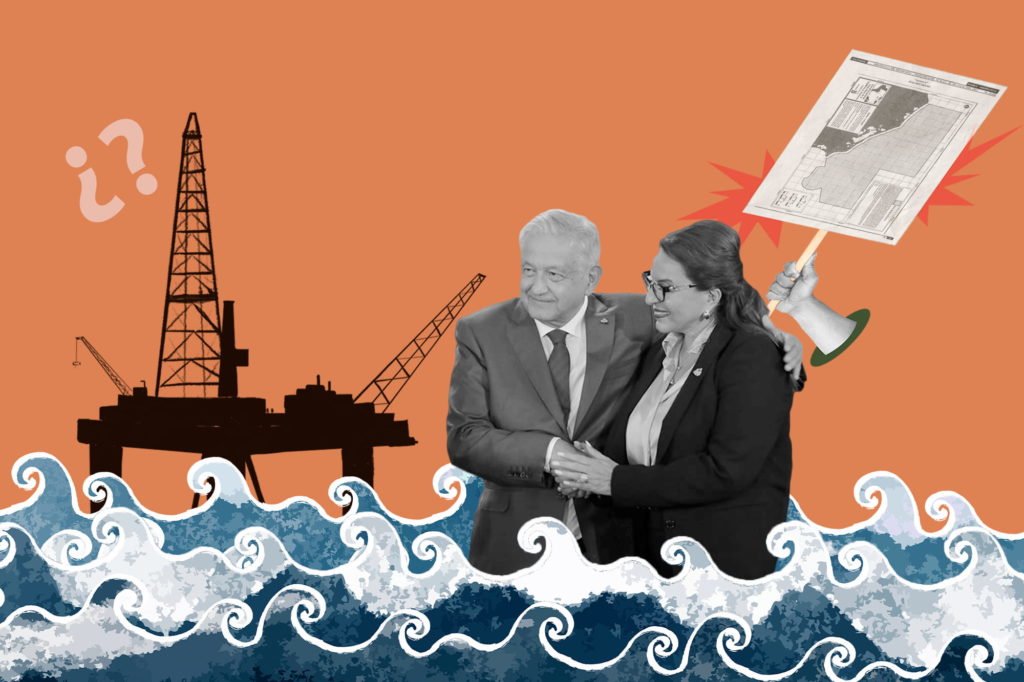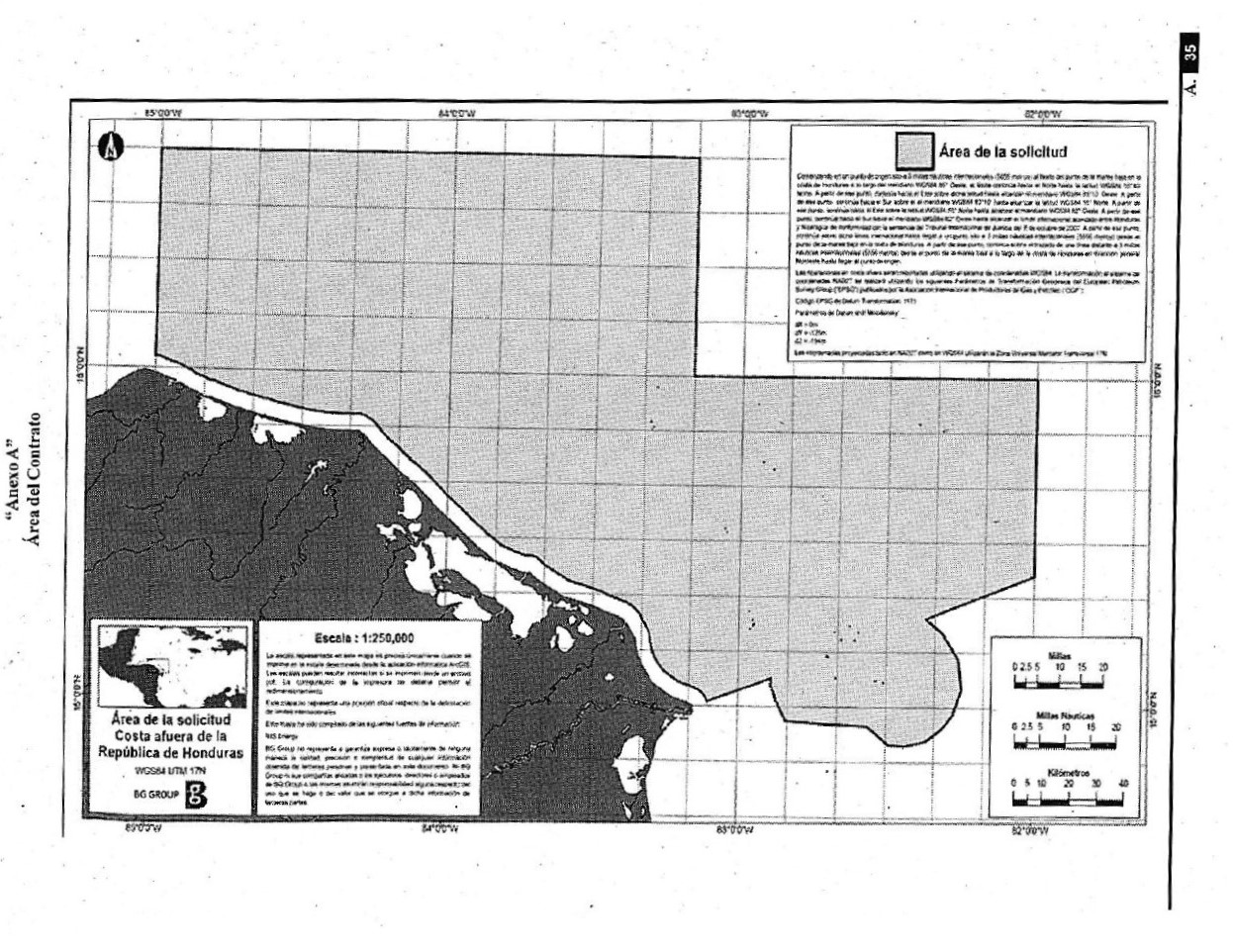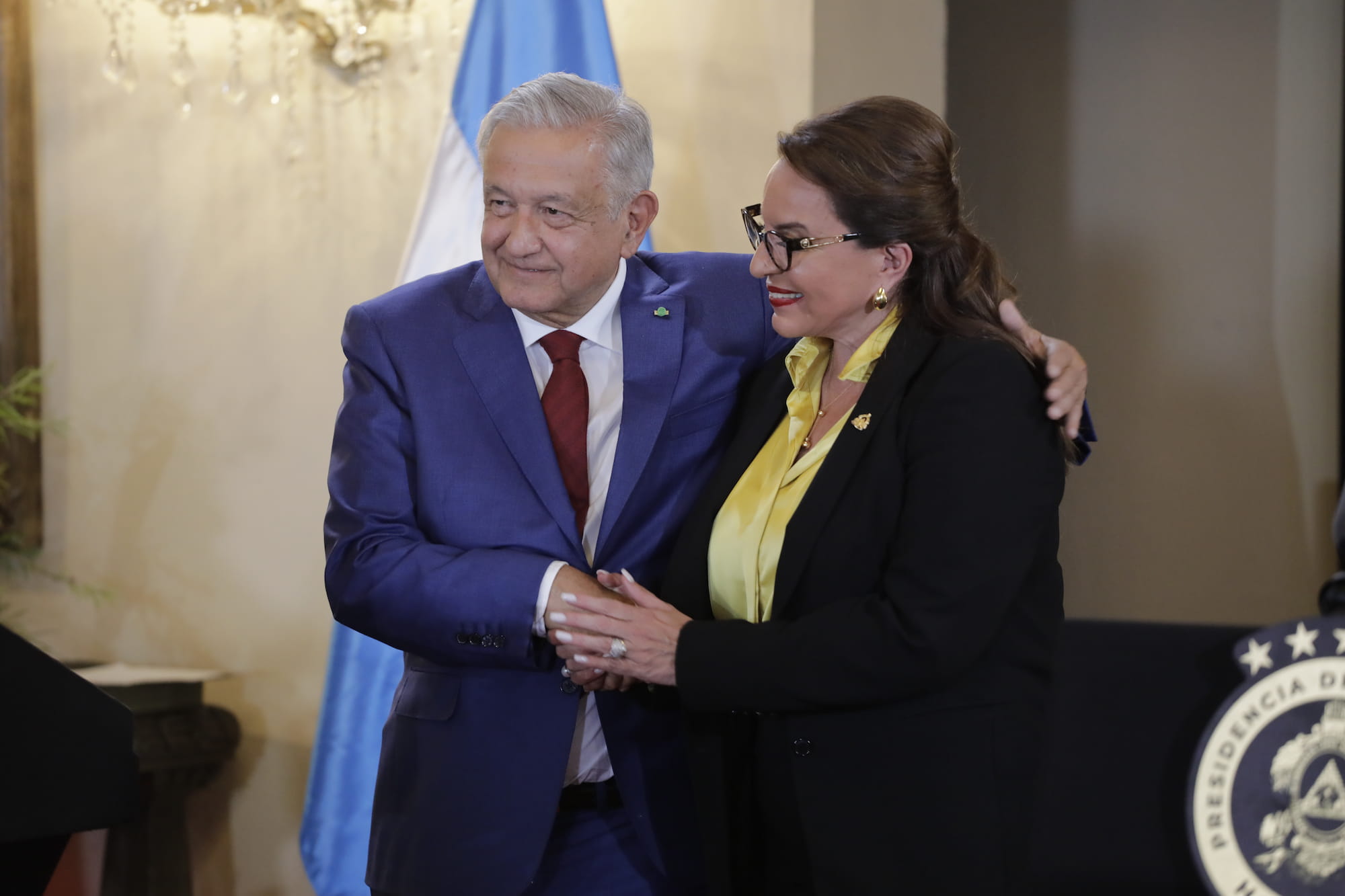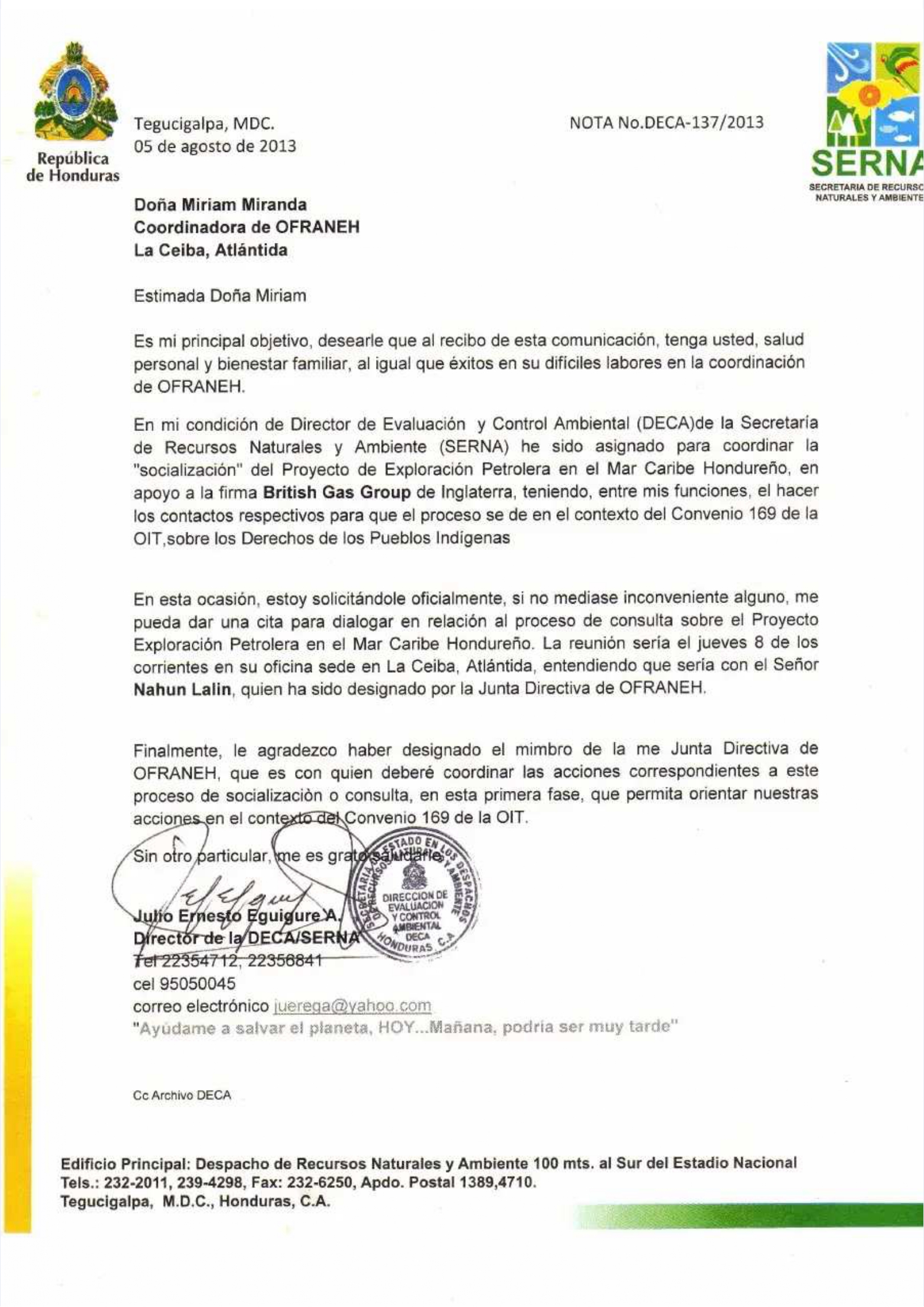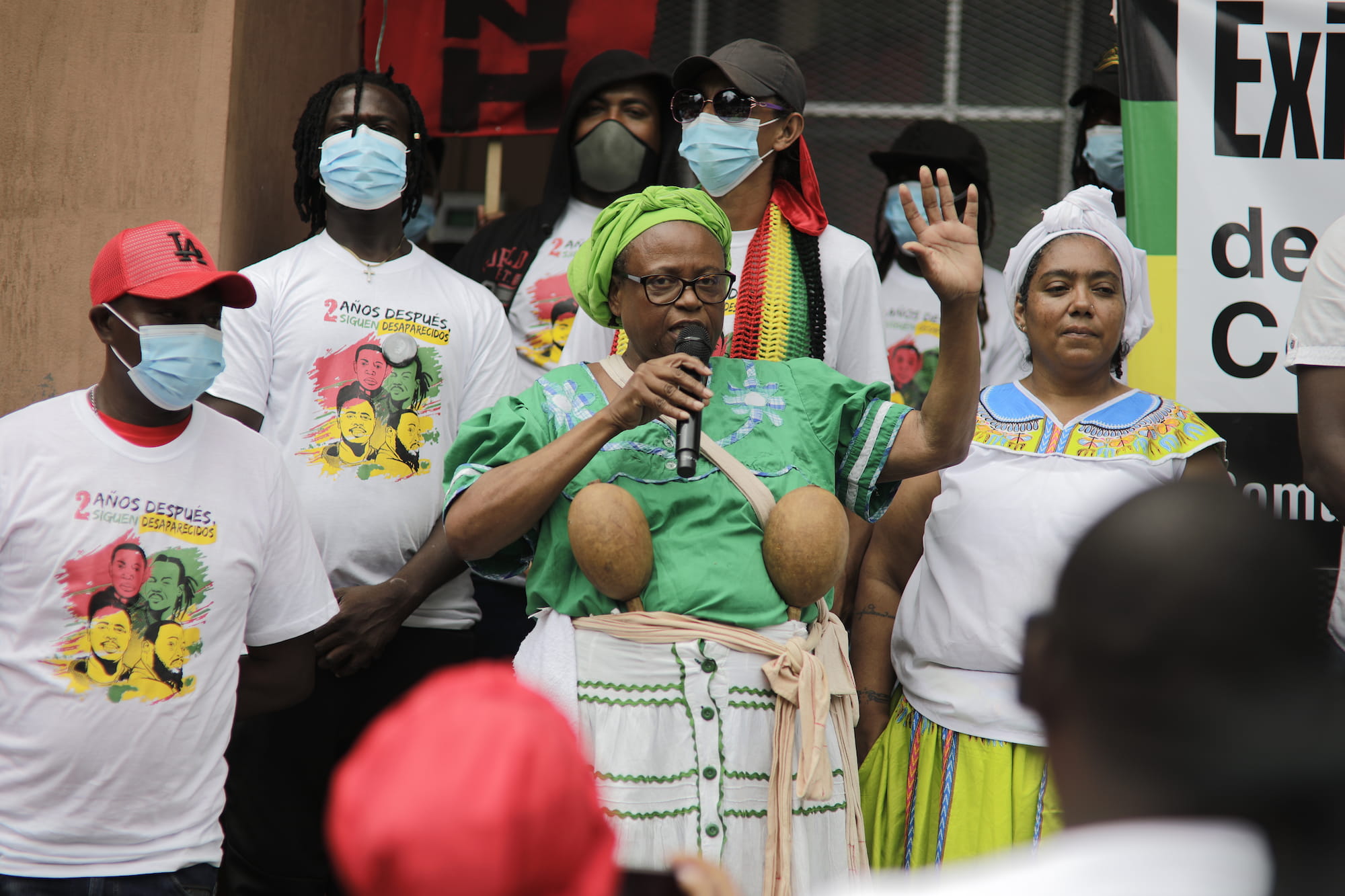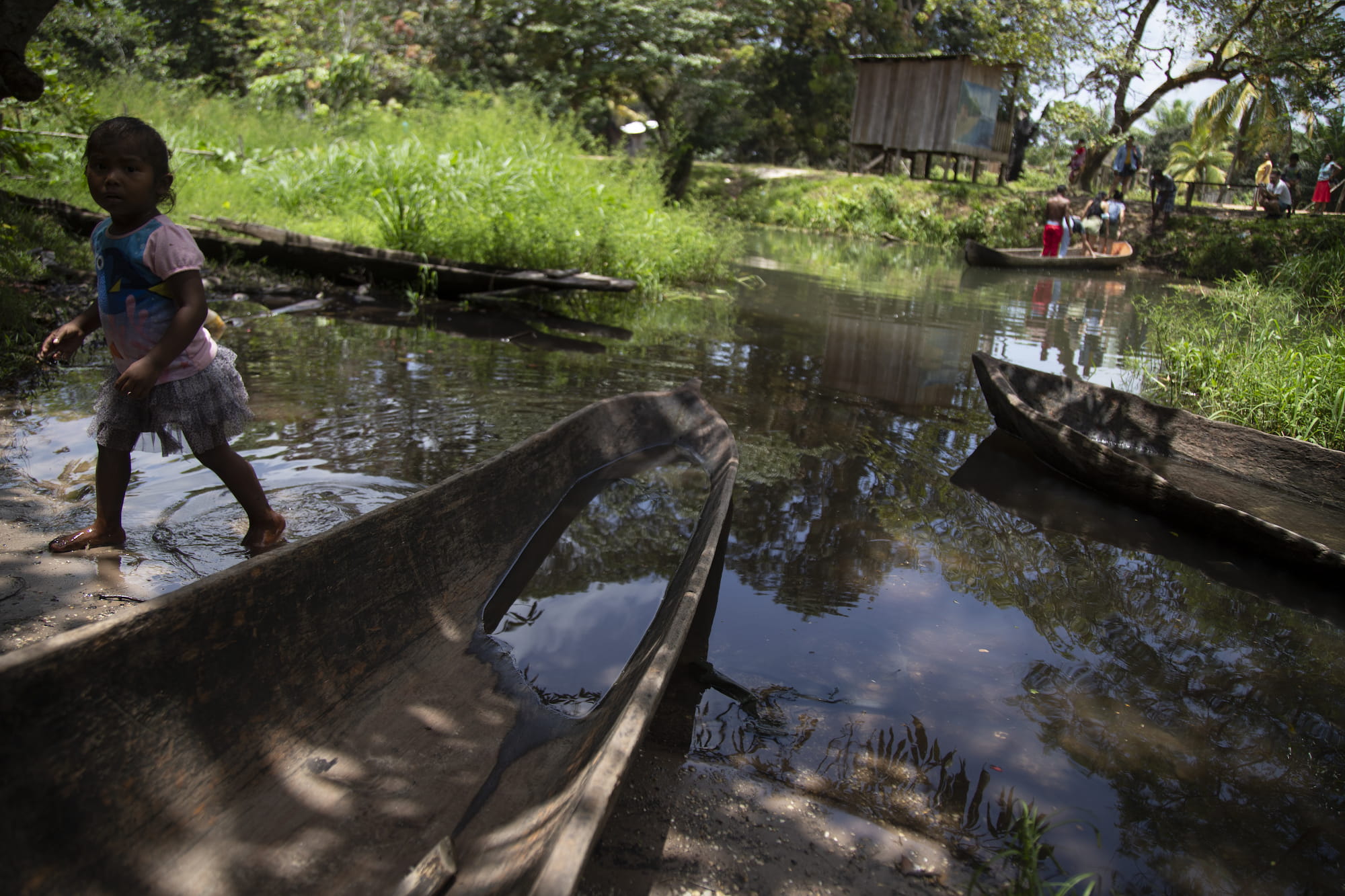An oil concession held by BG International Limited (BG Group) in Honduras’ Miskito Keys (Cayos Miskitos), home to the indigenous Garífuna community, is under question by that community. Garífuna leader Miriam Miranda says BGI Group’s exploration and exploitation project began, and continues, without carrying out a free and informed prior consultation with the Garífuna - an obligation under the law which requires such consultation with any region’s indigenous people. Currently covered by an ‘Additional Exploration Period’ within which drilling an exploration well is permitted; energy minister Erick Tejada says stopping the project could result in violation of BG Group’s contract, thereby resulting in lawsuits with damages for the State.
Currently covered by an ‘Additional Exploration Period’ within which drilling an exploration well is permitted; energy minister Erick Tejada says stopping the project could result in violation of BG Group’s contract, thereby resulting in lawsuits with damages for the State.
Text: María Celeste Maradiaga
Photographs: Jorge Cabrera and Fernando Destephen
Cover image: Daniel Fonseca
To date (December 2022), the citizens of the Miskito Keys in Honduras remain in the dark about the progress of BG Group’s oil drilling project on their land.
The first exploration period was granted for a period of four years, after the effective date of the contract on July 25, 2013, with extension possible up to six years, in 2019.
At the same time, according to clause 11 of the contract: “at the request of the contractor, the evaluation period may be extended by the Department of Natural Resources and Environment (Secretaría de Recursos Naturales y Ambiente – SERNA) as long as it is justified and in accordance with Article 54 of the Hydrocarbons Law, approved in 1985”.
The discoveries from the additional exploration period were mentioned in the concession agreement which set the rights and obligations for the BGI Group in 2017. At the same time, a concession agreement was given to the companies Azipetrol Honduras S.A and CARIBX (UK) Limited.
In April 2017 the Ministry of Energy favored the concession agreements based on the additional exploration period report from 2016. The agreement established a favorable decision for Azipetrol Honduras S.A and CARIBX (UK) LIMITED with 85% operation clearance.
According to a response from the Ministry of Energy to a request for information from Contracorriente, the company Azipetrol Honduras is contractually still in the exploration stage in its first phase and that, according to clause 13 of the contract, that company is currently operating in 50% of the area initially awarded for the concession.
“At the moment, [the project] is in the exploration stage, till this day the contract has not suffered any modification…” explained the ministry.
Image: Area of the oil concession in the Miskito Kays according to the contract between BG Group and the state of Honduras published in La Gaceta on July 25, 2013.
Clause 13 of the oil concession operation contract says that, “upon completion of the fourth year after the entry into force of this contract, whether or not hydrocarbons have been found, it will return at no cost to the State [of Honduras], a minimum of 50% of the contract area”.
Moreover, clause 12 of the contract specifies that if the contractor determines that a discovery of oil or natural gas is unexceptional or cannot lead to commercial exploitation, the contractor may propose modifications to the commercial terms of the contract. According to the Ministry of Energy’s response to Contracorriente, this has not happened.
SERNA said they would not share requested information, saying that, due to the relationship between the Ministry of Energy and BG Group stipulated in clause 24 of the operation contract, such information delivered to the state by private parties is of a confidential nature.
SERNA noted that exploration is in phase one, and that the ministry has the bi annual reports of activities presented on October 27, 2020.
Oil companies keen to exploit Honduras
That an oil company has a contract to carry out exploration in the Miskito Keys is the consequence of decades of studies, negotiations and ‘green lighting’ from politicians.
After in 2007 the Instituto de Geociencia Japex (IGJ) and the Government of Honduras signed an agreement for oil studies in the Honduran Caribbean, in 2009 the company Norwegian Petroleum Geo-Services (PGS) began to carry out seismic studies in Honduras’ sea territories, something that lasted 10 years.
One of the first to affirm that the Honduran government was interested in oil extraction was Tomas Vaquero, who in 2008-2009 was the secretary of the Department Natural Resources and Environment in the government of former President Manuel Zelaya Rosales. Currently Vaquero is Minister of Government, Justice and Decentralization in the administration of President Xiomara Castro.
In a March 2009 article in La Prensa, Tomas Vaquero stated that at that time PGS was exploring 8 thousand nautical miles. He also said there were four companies interested in exploring or harvesting oil in Honduras: PDVSA (Petróleos de Venezuela), Chevron (USA), Petrobras (Brazil) and Pemex (Mexico).
The relationship with Pemex began to be realized in 2022, 15 years after Vaquero’s statements. In June of that year the Minister of Energy, Erick Tejada, visited the company and met with its director, Octavio Romero. According to the officials present, the purpose of the meeting was to advance commitments made between Xiomara Castro and the President of Mexico, Andrés Manuel López Obrador.
In May 2022, López Obrador visited the Presidential House for a meeting with President Castro. Among the most important points of this dialogue were the Honduran government’s efforts in terms of migration, food security, the new energy matrix and boosting the development of oil centers in Honduras through Mexico’s support for oil exploitation.
The joint press release between the Mexican president and the Honduran president refers to “…the potential for development that the oil fields in La Mosquitia and the Caribbean Sea represent for Honduras.”
Further, “in response to Honduras’ request, Mexico will seek to identify areas of collaboration to provide support and advice for oil exploration and exploitation in these areas.”
In an October 2022 interview with Contracorriente, energy minister Erick Tejada said the purpose of the meeting with Pemex last June was “to forge a long term alliance” between Mexico and Honduras around “the transfer of knowledge and technology”.
Regarding the oil concession, the minister said that it is in an “embryonic phase”. He also said the State is analyzing the contract granted to BG Group in 2013 and studying whether an extension should be granted to the company that won the concession to continue exploring.
“The purpose of the visit to Pemex was, above all, to strengthen the technical capacities of the Ministry of Energy in terms of exploitation and exploration of hydrocarbons” said the ministry, adding that Honduras is “looking to the future in case it is necessary to develop an oil industry in the country – considering whether there is “a possibility of commercialization”. The minister added that the government was committed to doing this while being “respectful of the rule of law” where “there is currently a concession” (the BG Group project).
Regarding the intention of the current Government to continue with the operation of the BG Group contract, Tejada explained that, as there is already an investment by the company, non-compliance with the contract by the state of Honduras could result in lawsuits against th state. He added that it is the duty of the state of Honduras to establish a position regarding the oil resource once it is determined whether it is marketable or not.
No community consultation, only pretenses
Miriam Miranda, coordinator of the Honduran Black Fraternal Organization (Organización Fraternal Negra Hondureña – OFRANEH), explained to Contracorriente that, before starting this project, the company did not carry out a legally mandated ‘free and informed prior consultation’ with the Garifuna community living in the Moskitia area.
Within the ‘socialization’ process of the oil project – i.e. involving society and local communities in the project, including a consultation process – SERNA sent a note to Miranda inviting her participation. This was on August 5, 2013 – when the contract between BG Group and the state of Honduras had already been published in the official government newspaper, La Gaceta, on July 25, 2013.
Miranda said that energy is a necessary issue for Honduras. But she argued that this “does not mean that there should not be consultations”, “real information given to the communities” or that consent from communities is never given.
Miranda also indicated that the Garífuna people have been monitoring the actions of the Honduran government after the visit of the Mexican president regarding the exploration and exploitation of hydrocarbons.
“This shows that this government is going to follow up on these agreements, because there has been no intention to submit this issue to consultation,” she said.
According to a report by the Social Forum on Foreign Debt and Development in Honduras (Foro Social de la Deuda externa y Desarrollo de Honduras – FOSDEH), the indigenous Miskito people have denounced the consultation process by the BG Group company. Unlike the Garífuna, however, the Miskito have “entered into negotiations with BG Group.” The report states:
“Just like OFRANEH, the leaders of [Miskito organization] MASTA stated that no prior consultation was carried out, since the contract was approved before the organization had been contacted. However, MASTA had meetings with the company in 2013 to agree on annual rewards of $250,000 for local development.”
An oil spill would wipe out wide biodiversity
According to a study by biologist Juan Carlos Carrasco, the Miskito Keys contain mangroves, seagrasses and shallow fringing reefs, which can be classified as RAMSAR wetlands, which harbor an important diversity of species.
Carrasco’s study notes that the economic activity of this site is lobster and sea cucumber fishing, with seasons in early March and late June.
“When the season opens, the Miskito Keys receive around 2,000 fishermen/divers who settle in the different keys. In addition, during this season, about 238 commercial fishing boats sail near the cays and approximately 4,000 fishermen/divers live in the keys,” the report states.
The report also notes that only two coral reef monitoring expeditions have been carried out in the Miskito Keys region, despite the artisanal and industrial fishing that takes place in this area.
Among Carrasco’s most important findings are that the region has: a high coverage of endangered corals, an absence of white syndrome coral disease, high density of seabird species not previously reported in the area, three physiognomic types of mangroves and a high anthropogenic impact.
The FOSDEH report says that the Miskito Keys are proposed for protected area status. The area is mentioned in Article 18 of the Convention for the Conservation of Biodiversity and Protection of Priority Wilderness Areas in Central America, to be developed and protected, signed in 1992.
The report also details that, among the multiple consequences of a possible oil spill are the impact on the entire length of the Atlantic coast (approximately 671 kilometers) and the damage to wildlife and humans that can be caused by the minerals and metals such as mercury and arsenic deposited by the oil.
Miriam Miranda of OFRANEH said that one of the most worrying things about the BG Group oil concession is the environmental damage that an oil spill could bring; destruction that could reach the coasts of Omoa, La Ceiba, and Tela in the north of Honduras.
Miranda questioned the government’s decision to continue with this and other resource concessions which directly affect indigenous peoples, their territory, and the ecosystem in which they reside and where indigenous rights are increasingly violated.
“This government must dissociate itself from the decisions of … the previous government, of the narco-dictatorship,” she said.
Contracorriente approached SERNA Secretary, Lucky Medina, for comment on the oil concession. He responded that the issue is not related to SERNA.

